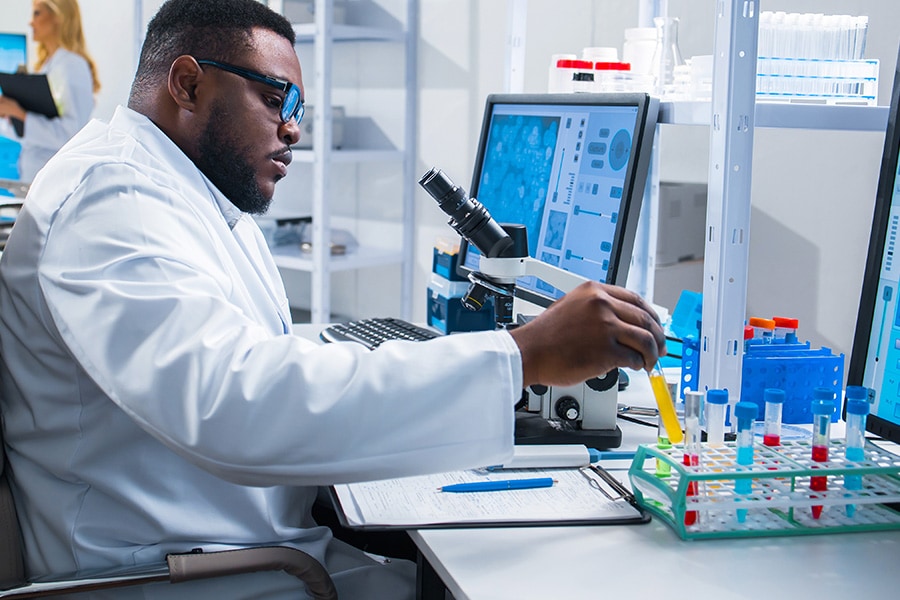
COVID-19 has tested the capabilities and processes of the Pharmaceutical and Life Sciences (PLS) industry like never before.
From rapidly scaling pharmaceutical manufacturing to relieving bottlenecks in secondary care, we understand how much the PLS sector is changing.
As the conversation shifts to post-COVID recovery, governments and businesses can seize an opportunity for change and make Australia a leading global player in the life sciences industry to innovate, grow and deliver medical breakthroughs. Global and Australian PLS businesses have a critical role to play in the health, wealth and resilience of the country.

Top 5 trends we see impacting the pharmacueticals and life sciences sector:
The 2021-22 Federal budget includes several proposals to create opportunity within the PLS sector including:
- Manufacturing and R&D incentives
- A patent box tax concession
- A reduction in red tape for Employee share schemes (ESS)
While no new funding was allocated, funding priorities under the Modern Manufacturing Initiative (MMI) and the Supply Chain Resilience Initiative (SCRI) are more specific. This will help Australia build capability in areas of greatest benefit such as local mRNA vaccine manufacturing.
The patent box tax regime should further encourage local manufacturing. A corporate tax rate of 17% on corporate income derived from patents, will incentivise companies to locate IP in Australia. It will also expand companies’ local R&D scope through to commercialisation.
The future of Australia acting as a manufacturing and R&D hub for the Asia Pacific region is becoming a lot more attractive. Until then, Australia will continue to depend on imported products, pharmaceuticals, medical devices and their underlying materials.
Harness the increasing focus on care in the community and decentralised trials
One of the most critical domestic learnings from the COVID pandemic is the importance of delivering care within the community.
Healthcare systems that found ways to shift care away from hospitals and into the community, prevailed. An increased focus on community care meant that systems could successfully manage the acute peaks and troughs that defined COVID response care pathways. This trend is set to continue with significant benefits in cost and quality of care. This is the time for PLS companies and healthcare providers to come together and co-design the patient and treatment journeys taking into account these new innovations:
- Digital devices
- Advanced therapies
- Genomics
- Patient homecare administration programmes
- Self-injectables
- A more holistic approach to outcomes based care
Clinical research is also undergoing fundamental transformation globally. The digitisation of healthcare records and increasing comfort with technology-enabled remote monitoring have enabled remote and decentralised trials. Theoretically, patients anywhere in the world can become part of a global clinical trial. This creates opportunities for patients in Australia to gain access to highly innovative experimental medicines.
Keep pace with changing customer engagement models
Among other emerging trends, COVID-19 accelerated digital customer engagement. In a recent global survey of over 500 physicians, we found that three-quarters of today’s physicians:
- Anticipate interacting less with pharma industry in Australia in the future
- Find value in only half of face-to-face contacts
Traditional customer engagement models typically focus on the number of calls made and messages delivered. New commercial models feature fewer but more impactful face-to-face contact points that are supported by effective personalised digital content. When adopting a newer model, consider the implications it will have on your commercial PLS organisation, including:
- Size
- Culture
- Technologies
- Performance management approach
- Leadership skill set
Many pharma companies are reskilling their workforce to operate in a blended digital environment. This is helping to rebalance the role of the sales force versus medical affairs organisations.
Cross-border investment is likely to continue
On a positive note, pharma and life sciences deal activity is expected to remain strong in the near-term. Overseas investment in Australian research capabilities such as MRI and CRO, should continue from both financial sponsors and trade players. This is bolstered by Australia's strong reputation as a leading destination for research. New government incentives such as the patent box regime will further strengthen Australia’s reputation.
However, outbound acquisitions by Australian PLS providers may not reach the expected levels of FY22. These expectations were heavily centred around CSL's acquisition of Vifor and may be replaced by local M&A companies who are looking to:
- Expand the scope and scale of their offerings
- Access a pipeline and platforms for growth
Grow responsibly and deliver on the ESG agenda
COVID-19 has highlighted huge health inequities that exist in society around the world. Innovative medicines and their treatment pathways need to account for these non-clinical differences to achieve the best patient outcomes. One way to show your value is by highlighting how your PLS organisation is prioritising the social determinants of health.
Beyond innovative medicines, the pharmaceuticals and life sciences industry needs to focus on broader Environmental Social and Governance (ESG) topics. This will include understanding and addressing your environmental impact across:
- Carbon emissions
- Waste within the production process and of end-products
- Product sustainability and packaging
Addressing your ESG impact is also an opportunity to embrace circularity and forge new partnerships of mutual benefit. In particular, organisations with large and complex supply chains will be a major focus. Opportunities for social procurement and ethical sourcing that drive societal value will also be beneficial.
Our pharmaceutical and life sciences services
Our suite of pharmaceutical and life sciences services supports you to develop and embed new commercial models of care that keep patients healthy and deliver true value. These are the seven key ways that our passionate community of solvers can help you succeed with your health service vision:
- Pharmaceutical and Life sciences consulting services
- Assurance services in health
- Expert deals services
- Customer experience
- Cybersecurity and digital trust
- The Future of Work in Health
- Environment, Social and Governance (ESG)
Pharmaceutical and Life sciences consulting services
Maximise commercial outcomes and business sustainability through growth, commercial strategies, go-to-market models and successful launches that are tailored to the needs of the Australian market.
Assurance services in health
Navigate regulatory complexity and strengthen trust and transparency across the full spectrum of risk from financial, to cyber and digital trust and clinical.
Expert deals services
Succeed across the deal lifecycle by raising capital and completing acquisitions, divestitures, and alliances.
Customer experience
Put customer experiences at the centre of the treatment journey delivering better individual health and societal outcomes.
Cybersecurity and digital trust
Integrate cybersecurity and digital identity into health & wellbeing solutions for secure digital experiences.
The Future of Work in Health
Rethink work and explore new and better ways of striking the right balance on mental health and wellbeing.
Environment, Social and Governance (ESG)
Develop valuable sustainability strategies for patients, suppliers, clinicians, investors and the environment.
Contact us




















